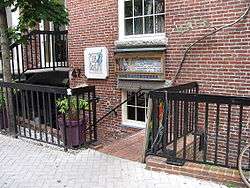Club Passim
Club Passim is an American folk music club in the Harvard Square area of Cambridge, Massachusetts. It was opened by Joyce Kalina (now Chopra) and Paula Kelley in 1958,[1] when it was known as Club 47 (based on its then address, 47 Mount Auburn Street, also in Cambridge; it moved to its present location on Palmer Street in 1963), and changed its name to simply Passim in 1969. The Donlins who ran the club during the 1970s pronounced the name PASSim, and Bob Donlin said this as he welcomed people to the shows with the always-out-of-adjustment mic stand microphone, but those who didn't know that always said PassEEM, perhaps thinking they were correct. It adopted the present name in 1994; a combination of the earlier two names. At its inception, it was mainly a jazz and blues club, but soon branched out to include ethnic folk, then singer-songwriter folk.[2]

Artists who have performed there include Joan Baez, Shawn Colvin, Bob Dylan, Tom Rush, Joni Mitchell, Suzanne Vega, Muddy Waters and Jimmy Buffett. At times the Club was a place for blues musicians like Paul Butterfield and Elvin Bishop to play as well.
In the 1960s, the club (when known as Club 47) played a role in the rise of folk-rock music, when it began to book folk-rock bands whose music was unrelated to traditional folk, such as the Lovin' Spoonful.[3] The club's importance to the 1960s Cambridge folk scene is documented extensively in Eric Von Schmidt's Baby, Let Me Follow You Down: The Illustrated Story of the Cambridge Folk Years.[4] Scott Alarik described Club 47 as being "the hangout of choice for the new folkies" during that time.[2]
Today there is a Passim School of Music program, which offers workshops and classes to teens and adults.[5]
Musicians
Joan Baez described to Rolling Stone's Kurt Loder how she began performing at Club 47 in 1958 as a largely unknown Boston University student, playing on Tuesday nights as a means of providing entertainment because the jazz musicians who played there had Tuesday nights off; she would continue to perform regularly there through the early 1960s.
In 1961, Bob Dylan was said to have played at the club between sets for free so that he could say he had played at Club 47.[6] Dylan: A Biography gives a detailed account of Dylan's first visit to Club 47, where he saw Carolyn Hester perform and performed between Hester's sets in the hopes of impressing club manager Paula Kelley.[7]
Bonnie Raitt chose to attend Radcliffe College in Cambridge in order to be near Club 47, though the club closed temporarily after her first year as a student (1967).[8]
Bill Staines mentions Club 47 in his autobiography, The Tour. He saw his first coffeehouse performance there in 1962, as a sophomore in high school, and described Club 47 during the 1960s as "one of the premier folk venues in the country."
Bruce Springsteen was refused a gig at Club Passim.[9]
Dining at Club Passim
For some years, Club Passim shared space and featured food from the vegetarian and vegan restaurant Veggie Planet[10] until the end of August 2014, when Veggie Planet closed.[11] As of January 2018, brunch is served on Sunday mornings, as well as dinner to ticket holders for matinee and evening shows.[12]
According to Vanity Fair, Facebook co-founder Chris Hughes and his husband Sean Eldridge met each other on a blind date at Veggie Planet inside Club Passim.[13]
References
- Loder, Kurt (1983). "Joan Baez: The Rolling Stone Interview". Rolling Stone 4/14/83 (issue # 393).
- Cohen, Ronald (2002). Rainbow Quest: The Folk Music Revival and American Society, 1940-1970. University of Massachusetts Press (Amherst)
- Alarik, Scott. "From Club 47 to Club Passim", in Deep Community: Adventures in the Modern Folk Underground (2003). Black Wolf (Cambridge, Mass.)
- Unterberger, Richie (2002). Turn! Turn! Turn: The '60s Folk-Rock Revolution. Backbeat (San Francisco).
- Von Schmidt, Eric (1994). Baby, Let Me Follow You Down: The Illustrated Story of the Cambridge Folk Years, second edition. University of Massachusetts Press (Amherst)
- "Passim School Of Music". Club Passim. January 6, 2018. Retrieved January 6, 2018.
- White, Timothy (2001). James Taylor: Long Ago and Far Away. Omnibus (London)
- Spitz, Bob (1989). Dylan: A Biography. Norton (New York).
- Gaar, Gillian G. (2002). She's a Rebel: The History of Women in Rock & Roll (second edition). Seal (New York)
- "The History of Club Passim". Club Passim. Archived from the original on April 18, 2008. Retrieved September 1, 2011.
- Paulson, Kristen (13 February 2002). "Pizza Made With Politics". The Boston Globe.
- "Harvard Square's Veggie Planet to close". BostonGlobe.com. Retrieved 14 February 2015.
- "Food and Drink Menu". Passim.org. Retrieved 6 January 2018.
- https://www.vanityfair.com/news/2015/06/chris-hughes-sean-eldridge-new-republic-congress-run
External links
| Wikimedia Commons has media related to Club Passim. |
- Passim website
- Website for "For The Love of the Music", a documentary film about Club 47